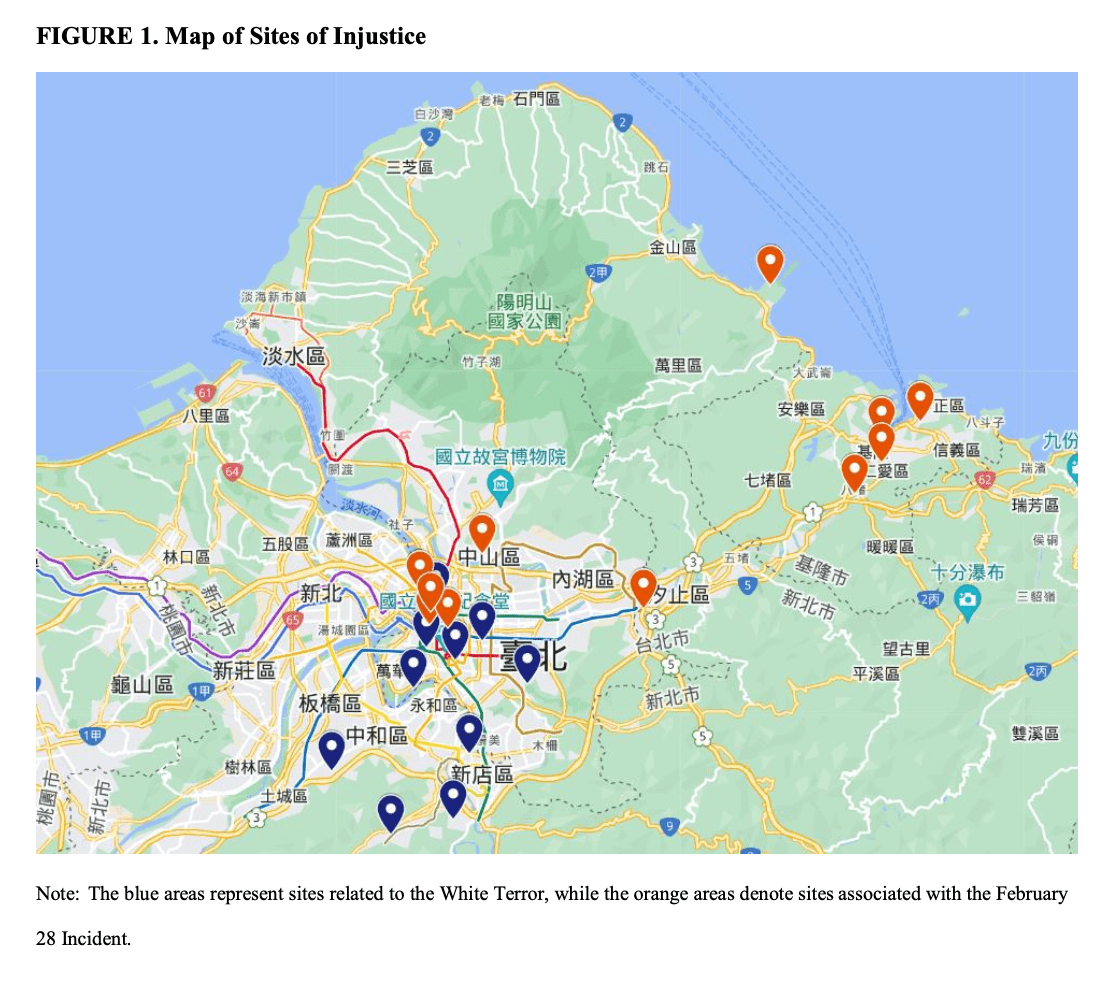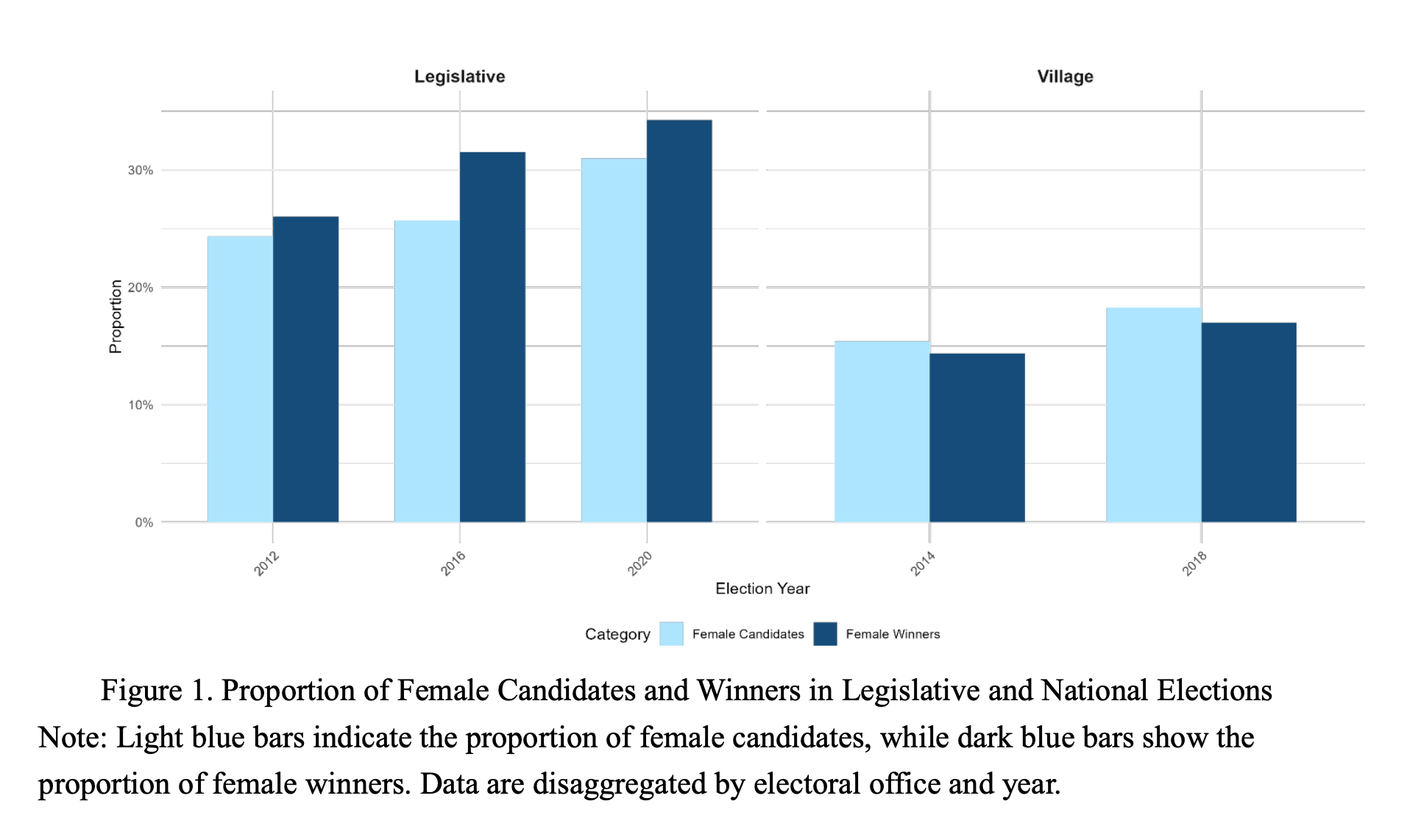The Effect of Sites of Injustice: Evidence from the
2022 Taipei Mayoral Election
Zhi-Ying Li
Prepared for discussion at the APSA CGOTS Annual Meeting, Philadelphia, September 5, 2024
Discussion:
Discussant:
Karl Ho
University of Texas at Dallas
The Impact of Concurrent Campaigns on Referendum Voting:
The Case of Taiwan in 2018
Weng et al.
Gendered Candidate Persistency Across National and Local Elections
Huang, Yu-Siang
The Effect of Sites of Injustice: Evidence from the
2022 Taipei Mayoral Election
Zhi-Ying Li
Hu Fu Center for East Asia Democratic Studies
Prepared for discussion at the APSA CGOTS Annual Meeting, Philadelphia, September 5, 2024
Discussion:
Discussant:
Karl Ho
University of Texas at Dallas
Research question
-
The paper investigates the impact of historical "sites of injustice" in Taiwan, such as those from the 228 Incident and White Terror period, on voting behavior in the 2022 Taipei Mayoral Election, focusing on whether proximity to these sites influenced support for Chiang Wan-an, a descendant of the Chiang family.
-
Key Hypothesis: Proximity to sites of injustice might create cognitive dissonance in voters, leading them to either reject or support candidates associated with authoritarianism, like Chiang Wan-an.
Motivation

Key findings
-
Different Effects of 228 Incident and White Terror Sites:
- Villages located closer to White Terror sites showed higher support for Chiang Wan-an.
- Villages closer to 228 Incident sites showed lower support for Chiang Wan-an.
- This highlights a divide in how different historical injustices influence voter preferences based on geographic proximity.
Key findings
-
Different Effects of 228 Incident and White Terror Sites:
-
No "Mitigating" Effect from Public Exhibitions:
-
Unlike European studies (e.g., Nazi camps in Germany), publicly exhibited sites of injustice in Taiwan (such as memorial parks or museums) did not significantly reduce the cognitive dissonance or diminish the political effects of these sites on voting behavior.
-
-
Key findings
-
Spatial Analysis and Political Attitudes:
-
Spatial regression and geographically weighted regression (GWR) were used to analyze voting patterns, showing that proximity to both White Terror and 228 Incident sites continued to shape political attitudes long after the events occurred.
-
Key findings
-
Support for Chiang Wan-an Linked to Authoritarian Symbols:
- The findings suggest that voters living closer to White Terror sites may have developed a tolerance for authoritarian symbols, possibly due to cognitive dissonance, leading to higher support for Chiang Wan-an, who carries the legacy of his family’s historical role in Taiwan’s authoritarian period.
Key findings
-
Influence of Socioeconomic Factors:
- The study controlled for various demographic and socioeconomic factors, such as population density, median income, and education levels. It found that older voters and areas with higher female population ratios were more likely to support Chiang Wan-an.
Issues and suggestions
-
Endogeneity
-
Isolating spatial and other SES effects is difficult, even controlling these variables in same model.
-
"Will KMT voters move in or away from the sites due to the long term memory of 228 and white terror events"
-
-
Issues and suggestions
-
Measurement of Proximity:
- The distance between villages and sites of injustice is used as a key independent variable. However, proximity alone may not fully capture the complex relationship between voter behavior and historical memory.
- Districting or traditional redistricting could have inertia effect to consolidate KMT support?
-
Deeper Exploration of Mechanisms:
- While the study discusses cognitive dissonance, it does not fully explore the mechanisms by which proximity to sites of injustice affects political preferences. Future research could delve into how generational memory or public education about these sites shapes voter behavior.
Issues and suggestions
-
Longitudinal Analysis:
- A longitudinal analysis across multiple election cycles (particularly with Chen and Ko) could help identify whether the effects of proximity to sites of injustice are persistent or fluctuate depending on the political context.
Issues and suggestions
-
Style:
Coefficients being zero are non informative
Issues and suggestions
Issues and suggestions

The Impact of Concurrent Campaigns on Referendum Voting:
The Case of Taiwan in 2018
Ting-wei Weng
Tsung-han Tsai
Ying-lung Chou
Ching-hsin Yu
Prepared for discussion at the APSA CGOTS Annual Meeting, Philadelphia, September 5, 2024
Discussion:
Discussant: Karl Ho
University of Texas at Dallas
Research question
- The paper investigates the effect of concurrent elections, particularly how a referendum vote is influenced when held alongside a higher-order election, such as a mayoral election.
- focuses on Taiwan's 2018 election, where local elections and a multi-question referendum were held concurrently, with special attention to Taichung City.
Key Findings
-
Influence of Higher-Order Elections:
- Referendum voting is significantly influenced by voter preferences toward political figures rather than the specific issues posed in the referendum (party or leader coattail effect?).
- Voters who supported the incumbent mayor (Lin Chia-lung) were less likely to participate in or approve of the referendum initiated by the challenger (Lu Shiow-yen), demonstrating that referendums become a tool for expressing approval or disapproval of politicians rather than issue-based voting.
Key Findings
-
Partisanship:
- Partisanship played a crucial role in referendum voting. Voters leaning toward the Democratic Progressive Party (DPP) were less likely to approve the referendum questions, while those dissatisfied with President Tsai Ing-wen were more likely to approve the questions.
Key Findings
-
Limited Issue-Based Voting:
- Contrary to expectations, attitudes toward the specific issue (e.g., air pollution) were not significantly correlated with voting decisions on the referendum question. Instead, political preferences were the dominant factor.
Key Findings
-
Concurrent Elections and Voter Turnout:
- While holding elections concurrently increased overall voter turnout, it did so at the cost of reducing the salience of the referendum itself. Voters focused more on the higher-order mayoral election, allowing political attitudes to overshadow issue-based considerations.
Implications:
-
Referendums may fail to fulfill their intended purpose of facilitating issue-based democratic decision-making when held alongside more prominent elections.
-
Instead, they become tools for expressing political preferences about higher-order candidates and parties.
-
In question: efficacy of referendums as a mechanism for direct democracy, particularly when they are held concurrently with other elections.
Suggestions:
-
How to isolate and compare effects?
-
Style
- Why odd ratios in coefplot
Gendered Candidate Persistency Across National and Local Elections
Huang, Yu-Siang
National Taiwan University
Prepared for discussion at the APSA CGOTS Annual Meeting, Philadelphia, September 5, 2024
Discussion:
Discussant:
Karl Ho
University of Texas at Dallas
Does gender influence the likelihood of candidates running for future elections after an electoral defeat?
Does this effect differ between national and local elections?
Research Question
-
Female candidates are less likely to persist in national elections following defeat compared to local elections.
- Male candidates exhibit no significant difference in persistence rates between national and local elections.
Core Hypothesis
Key findings

- Gender Differences: Female candidates are more likely to withdraw after losing national elections compared to local elections, supporting the hypothesis.
- Male Candidates: No significant difference in persistency between national and local elections for male candidates.
Key findings
Impact of Party Gatekeeping: At the national level, party nomination processes and financial barriers disproportionately affect women.
- Supportive Local Networks: At the local level, personal networks and reduced financial stakes make it easier for female candidates to continue running, even after a loss.
Key findings
-
Strengths
-
Nuanced Findings: The paper identifies distinct gender dynamics across national and local elections in Taiwan, highlighting an important intersection between gender and electoral level.
-
Broader Implications: The findings have relevance beyond Taiwan, with clear applications to other countries with similar political systems, making the research potentially generalizable.
-
Remarks
-
Strengths
-
Limitations Acknowledged: The paper is transparent about its limitations, including sample size issues and the need for further research on specific mechanisms. This reflects a strong understanding of research design and methodology.
-
Remarks
-
Sample Size Limitation:
Problem: small sample sizes for national-level elections, which affects the precision of results, particularly regarding the gender gap in persistence (H1).
-
Suggestion: Consider exploring alternative methods to bolster statistical power, such as extending the study period to include more electoral cycles or make it a comparative study (e.g. South Korea, US)
Issues
-
Mechanisms driving these outcomes?
-
Party gatekeeping, financial barriers, and personal networks.
-
Suggestion: Mixed methods with qualitative (author suggests interviews) Add a case study will make it stronger
-
Issues
-
Broader Theoretical Integration:
-
The study could be more explicitly connected to broader theories of political ambition, gender and politics, and electoral behavior
-